Exploring Power and Hierarchy in Australian Healthcare Systems
VerifiedAdded on 2023/06/03
|12
|3449
|294
Essay
AI Summary
This essay examines the role of sociological theories and concepts within the Australian healthcare system, focusing on the intrinsic hierarchy and power dynamics. It discusses sociological concepts like socialization, social order, and social stratification, and their influence on the power hierarchy in healthcare settings. The essay analyzes functionalism theory, conflict theory, and symbolic interactionist approach, highlighting their implications for healthcare practitioners. It further explores how sociological theories impact the health of patients, dictate power hierarchy for smooth operations, and encourage healthy living. The essay concludes by emphasizing the importance of sociological understanding for medical practitioners, promoting fair treatment and responsible healthcare practices. This document is available on Desklib, a platform providing study tools and resources for students.
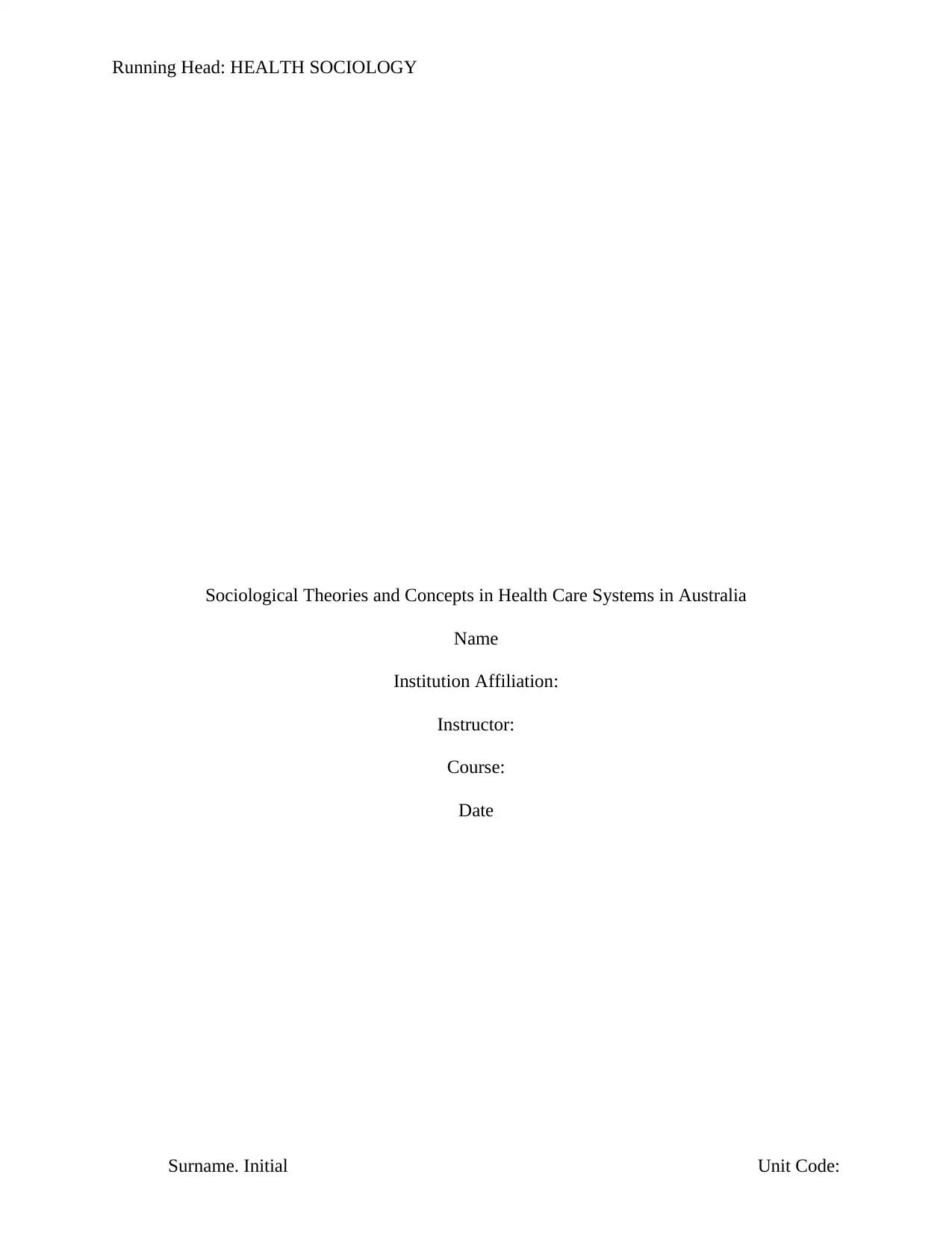
Running Head: HEALTH SOCIOLOGY
Sociological Theories and Concepts in Health Care Systems in Australia
Name
Institution Affiliation:
Instructor:
Course:
Date
Surname. Initial Unit Code:
Sociological Theories and Concepts in Health Care Systems in Australia
Name
Institution Affiliation:
Instructor:
Course:
Date
Surname. Initial Unit Code:
Paraphrase This Document
Need a fresh take? Get an instant paraphrase of this document with our AI Paraphraser
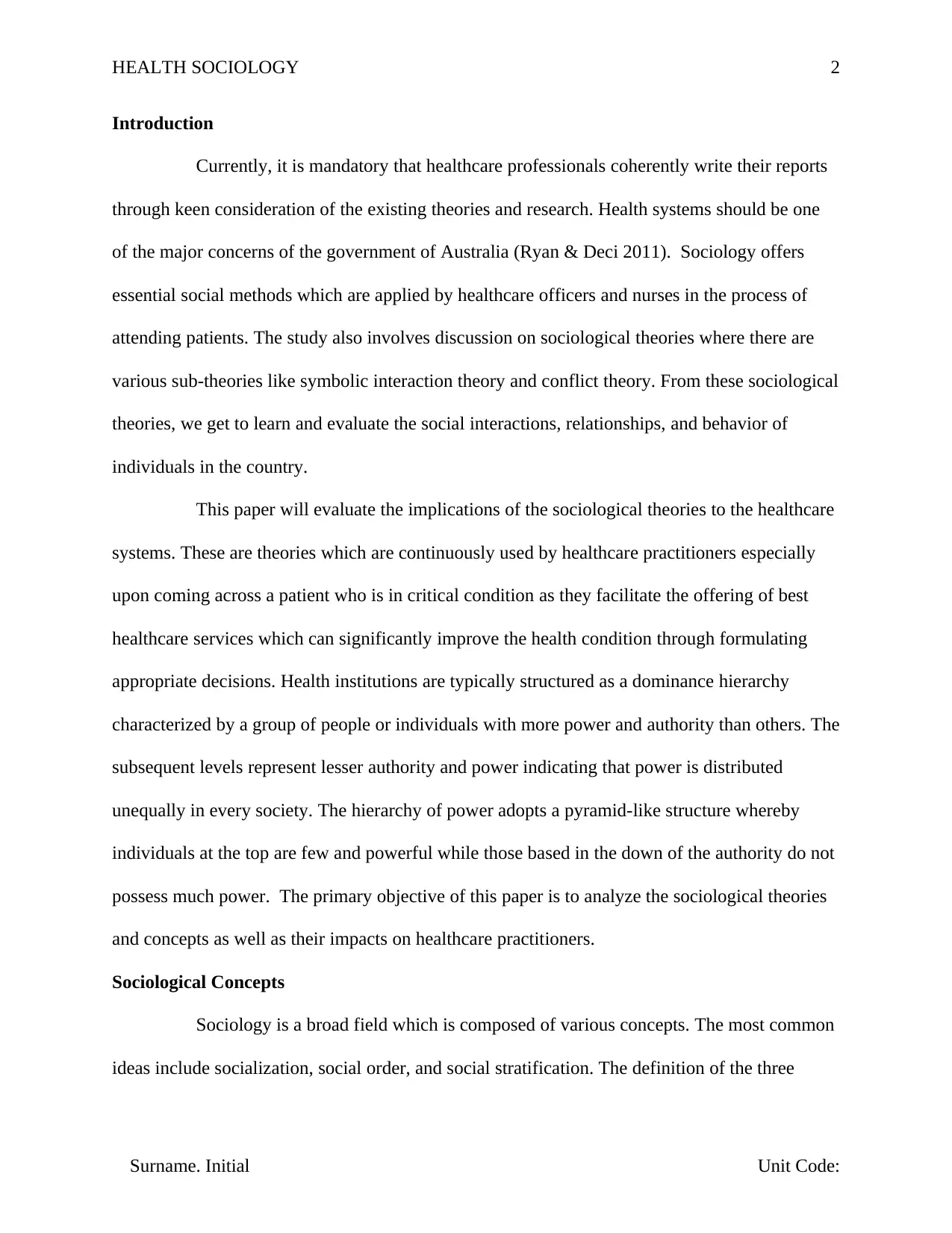
HEALTH SOCIOLOGY 2
Introduction
Currently, it is mandatory that healthcare professionals coherently write their reports
through keen consideration of the existing theories and research. Health systems should be one
of the major concerns of the government of Australia (Ryan & Deci 2011). Sociology offers
essential social methods which are applied by healthcare officers and nurses in the process of
attending patients. The study also involves discussion on sociological theories where there are
various sub-theories like symbolic interaction theory and conflict theory. From these sociological
theories, we get to learn and evaluate the social interactions, relationships, and behavior of
individuals in the country.
This paper will evaluate the implications of the sociological theories to the healthcare
systems. These are theories which are continuously used by healthcare practitioners especially
upon coming across a patient who is in critical condition as they facilitate the offering of best
healthcare services which can significantly improve the health condition through formulating
appropriate decisions. Health institutions are typically structured as a dominance hierarchy
characterized by a group of people or individuals with more power and authority than others. The
subsequent levels represent lesser authority and power indicating that power is distributed
unequally in every society. The hierarchy of power adopts a pyramid-like structure whereby
individuals at the top are few and powerful while those based in the down of the authority do not
possess much power. The primary objective of this paper is to analyze the sociological theories
and concepts as well as their impacts on healthcare practitioners.
Sociological Concepts
Sociology is a broad field which is composed of various concepts. The most common
ideas include socialization, social order, and social stratification. The definition of the three
Surname. Initial Unit Code:
Introduction
Currently, it is mandatory that healthcare professionals coherently write their reports
through keen consideration of the existing theories and research. Health systems should be one
of the major concerns of the government of Australia (Ryan & Deci 2011). Sociology offers
essential social methods which are applied by healthcare officers and nurses in the process of
attending patients. The study also involves discussion on sociological theories where there are
various sub-theories like symbolic interaction theory and conflict theory. From these sociological
theories, we get to learn and evaluate the social interactions, relationships, and behavior of
individuals in the country.
This paper will evaluate the implications of the sociological theories to the healthcare
systems. These are theories which are continuously used by healthcare practitioners especially
upon coming across a patient who is in critical condition as they facilitate the offering of best
healthcare services which can significantly improve the health condition through formulating
appropriate decisions. Health institutions are typically structured as a dominance hierarchy
characterized by a group of people or individuals with more power and authority than others. The
subsequent levels represent lesser authority and power indicating that power is distributed
unequally in every society. The hierarchy of power adopts a pyramid-like structure whereby
individuals at the top are few and powerful while those based in the down of the authority do not
possess much power. The primary objective of this paper is to analyze the sociological theories
and concepts as well as their impacts on healthcare practitioners.
Sociological Concepts
Sociology is a broad field which is composed of various concepts. The most common
ideas include socialization, social order, and social stratification. The definition of the three
Surname. Initial Unit Code:
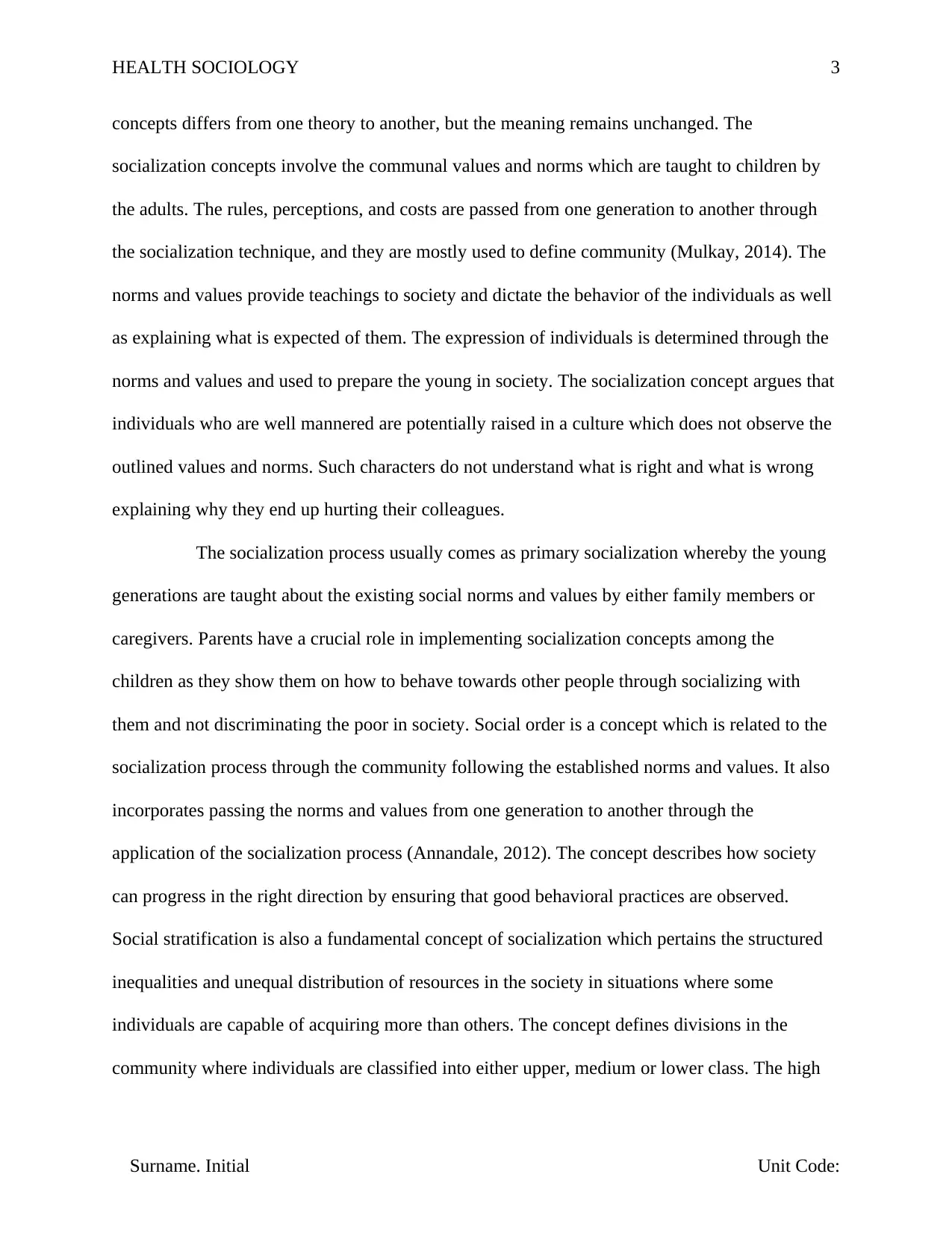
HEALTH SOCIOLOGY 3
concepts differs from one theory to another, but the meaning remains unchanged. The
socialization concepts involve the communal values and norms which are taught to children by
the adults. The rules, perceptions, and costs are passed from one generation to another through
the socialization technique, and they are mostly used to define community (Mulkay, 2014). The
norms and values provide teachings to society and dictate the behavior of the individuals as well
as explaining what is expected of them. The expression of individuals is determined through the
norms and values and used to prepare the young in society. The socialization concept argues that
individuals who are well mannered are potentially raised in a culture which does not observe the
outlined values and norms. Such characters do not understand what is right and what is wrong
explaining why they end up hurting their colleagues.
The socialization process usually comes as primary socialization whereby the young
generations are taught about the existing social norms and values by either family members or
caregivers. Parents have a crucial role in implementing socialization concepts among the
children as they show them on how to behave towards other people through socializing with
them and not discriminating the poor in society. Social order is a concept which is related to the
socialization process through the community following the established norms and values. It also
incorporates passing the norms and values from one generation to another through the
application of the socialization process (Annandale, 2012). The concept describes how society
can progress in the right direction by ensuring that good behavioral practices are observed.
Social stratification is also a fundamental concept of socialization which pertains the structured
inequalities and unequal distribution of resources in the society in situations where some
individuals are capable of acquiring more than others. The concept defines divisions in the
community where individuals are classified into either upper, medium or lower class. The high
Surname. Initial Unit Code:
concepts differs from one theory to another, but the meaning remains unchanged. The
socialization concepts involve the communal values and norms which are taught to children by
the adults. The rules, perceptions, and costs are passed from one generation to another through
the socialization technique, and they are mostly used to define community (Mulkay, 2014). The
norms and values provide teachings to society and dictate the behavior of the individuals as well
as explaining what is expected of them. The expression of individuals is determined through the
norms and values and used to prepare the young in society. The socialization concept argues that
individuals who are well mannered are potentially raised in a culture which does not observe the
outlined values and norms. Such characters do not understand what is right and what is wrong
explaining why they end up hurting their colleagues.
The socialization process usually comes as primary socialization whereby the young
generations are taught about the existing social norms and values by either family members or
caregivers. Parents have a crucial role in implementing socialization concepts among the
children as they show them on how to behave towards other people through socializing with
them and not discriminating the poor in society. Social order is a concept which is related to the
socialization process through the community following the established norms and values. It also
incorporates passing the norms and values from one generation to another through the
application of the socialization process (Annandale, 2012). The concept describes how society
can progress in the right direction by ensuring that good behavioral practices are observed.
Social stratification is also a fundamental concept of socialization which pertains the structured
inequalities and unequal distribution of resources in the society in situations where some
individuals are capable of acquiring more than others. The concept defines divisions in the
community where individuals are classified into either upper, medium or lower class. The high
Surname. Initial Unit Code:
⊘ This is a preview!⊘
Do you want full access?
Subscribe today to unlock all pages.

Trusted by 1+ million students worldwide
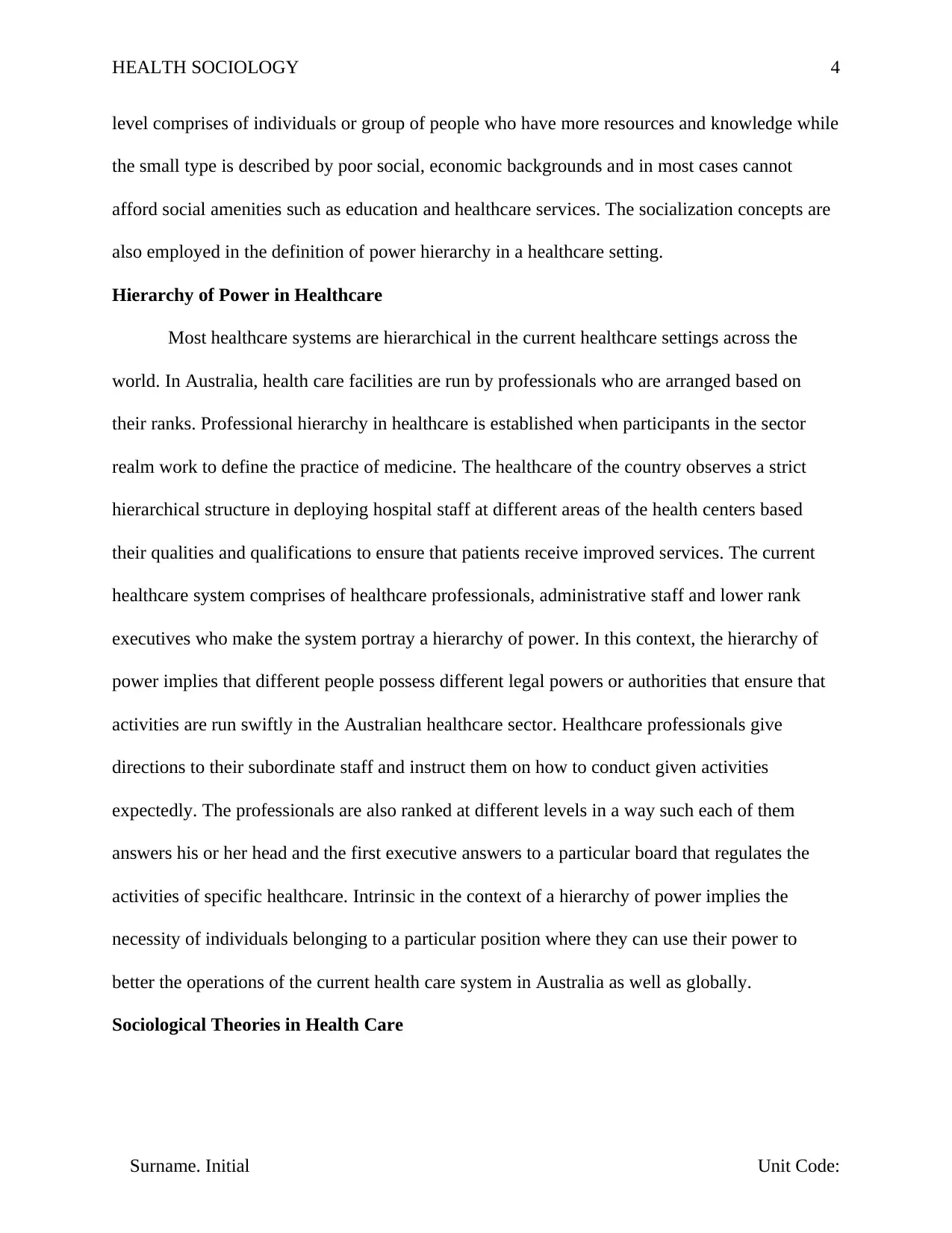
HEALTH SOCIOLOGY 4
level comprises of individuals or group of people who have more resources and knowledge while
the small type is described by poor social, economic backgrounds and in most cases cannot
afford social amenities such as education and healthcare services. The socialization concepts are
also employed in the definition of power hierarchy in a healthcare setting.
Hierarchy of Power in Healthcare
Most healthcare systems are hierarchical in the current healthcare settings across the
world. In Australia, health care facilities are run by professionals who are arranged based on
their ranks. Professional hierarchy in healthcare is established when participants in the sector
realm work to define the practice of medicine. The healthcare of the country observes a strict
hierarchical structure in deploying hospital staff at different areas of the health centers based
their qualities and qualifications to ensure that patients receive improved services. The current
healthcare system comprises of healthcare professionals, administrative staff and lower rank
executives who make the system portray a hierarchy of power. In this context, the hierarchy of
power implies that different people possess different legal powers or authorities that ensure that
activities are run swiftly in the Australian healthcare sector. Healthcare professionals give
directions to their subordinate staff and instruct them on how to conduct given activities
expectedly. The professionals are also ranked at different levels in a way such each of them
answers his or her head and the first executive answers to a particular board that regulates the
activities of specific healthcare. Intrinsic in the context of a hierarchy of power implies the
necessity of individuals belonging to a particular position where they can use their power to
better the operations of the current health care system in Australia as well as globally.
Sociological Theories in Health Care
Surname. Initial Unit Code:
level comprises of individuals or group of people who have more resources and knowledge while
the small type is described by poor social, economic backgrounds and in most cases cannot
afford social amenities such as education and healthcare services. The socialization concepts are
also employed in the definition of power hierarchy in a healthcare setting.
Hierarchy of Power in Healthcare
Most healthcare systems are hierarchical in the current healthcare settings across the
world. In Australia, health care facilities are run by professionals who are arranged based on
their ranks. Professional hierarchy in healthcare is established when participants in the sector
realm work to define the practice of medicine. The healthcare of the country observes a strict
hierarchical structure in deploying hospital staff at different areas of the health centers based
their qualities and qualifications to ensure that patients receive improved services. The current
healthcare system comprises of healthcare professionals, administrative staff and lower rank
executives who make the system portray a hierarchy of power. In this context, the hierarchy of
power implies that different people possess different legal powers or authorities that ensure that
activities are run swiftly in the Australian healthcare sector. Healthcare professionals give
directions to their subordinate staff and instruct them on how to conduct given activities
expectedly. The professionals are also ranked at different levels in a way such each of them
answers his or her head and the first executive answers to a particular board that regulates the
activities of specific healthcare. Intrinsic in the context of a hierarchy of power implies the
necessity of individuals belonging to a particular position where they can use their power to
better the operations of the current health care system in Australia as well as globally.
Sociological Theories in Health Care
Surname. Initial Unit Code:
Paraphrase This Document
Need a fresh take? Get an instant paraphrase of this document with our AI Paraphraser
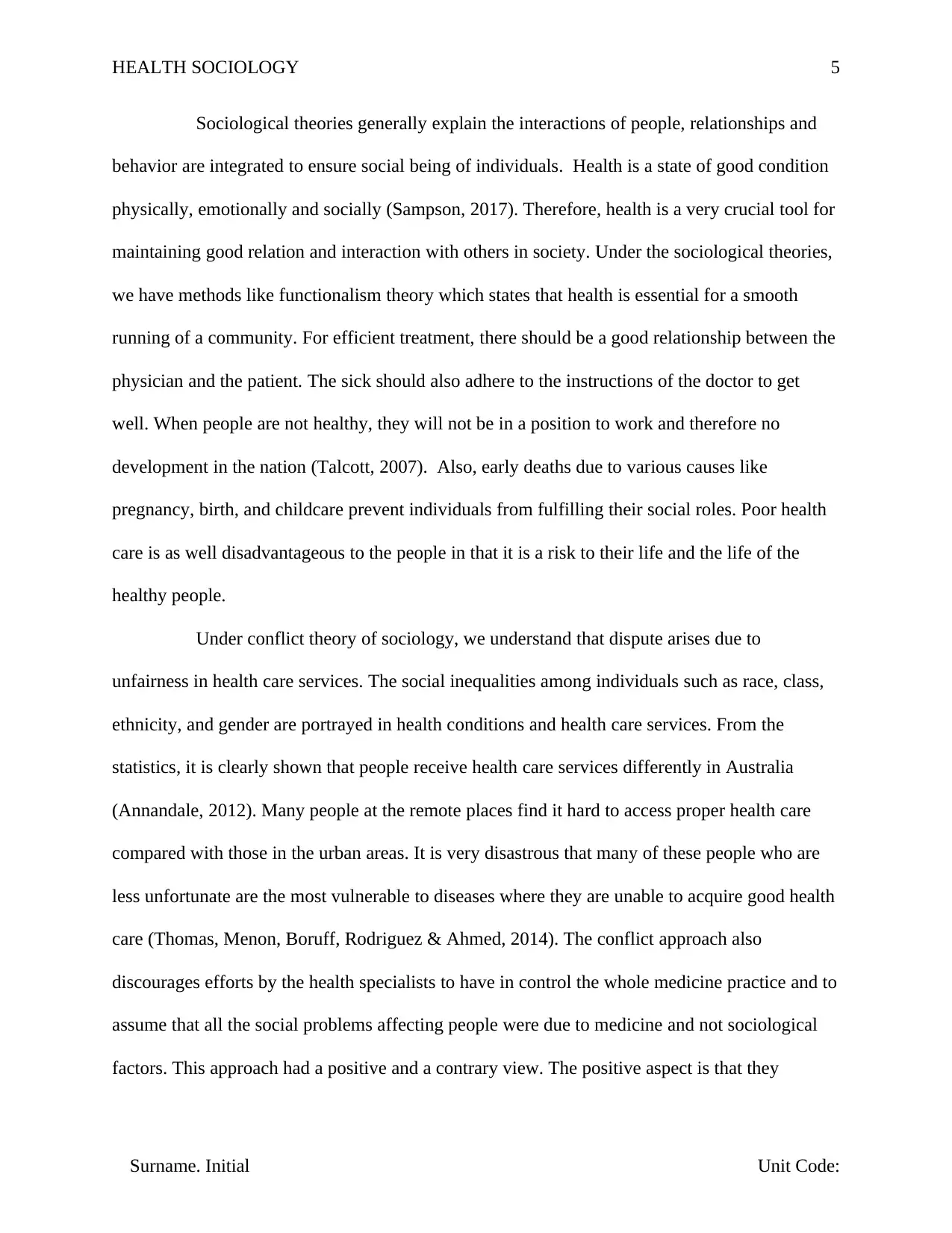
HEALTH SOCIOLOGY 5
Sociological theories generally explain the interactions of people, relationships and
behavior are integrated to ensure social being of individuals. Health is a state of good condition
physically, emotionally and socially (Sampson, 2017). Therefore, health is a very crucial tool for
maintaining good relation and interaction with others in society. Under the sociological theories,
we have methods like functionalism theory which states that health is essential for a smooth
running of a community. For efficient treatment, there should be a good relationship between the
physician and the patient. The sick should also adhere to the instructions of the doctor to get
well. When people are not healthy, they will not be in a position to work and therefore no
development in the nation (Talcott, 2007). Also, early deaths due to various causes like
pregnancy, birth, and childcare prevent individuals from fulfilling their social roles. Poor health
care is as well disadvantageous to the people in that it is a risk to their life and the life of the
healthy people.
Under conflict theory of sociology, we understand that dispute arises due to
unfairness in health care services. The social inequalities among individuals such as race, class,
ethnicity, and gender are portrayed in health conditions and health care services. From the
statistics, it is clearly shown that people receive health care services differently in Australia
(Annandale, 2012). Many people at the remote places find it hard to access proper health care
compared with those in the urban areas. It is very disastrous that many of these people who are
less unfortunate are the most vulnerable to diseases where they are unable to acquire good health
care (Thomas, Menon, Boruff, Rodriguez & Ahmed, 2014). The conflict approach also
discourages efforts by the health specialists to have in control the whole medicine practice and to
assume that all the social problems affecting people were due to medicine and not sociological
factors. This approach had a positive and a contrary view. The positive aspect is that they
Surname. Initial Unit Code:
Sociological theories generally explain the interactions of people, relationships and
behavior are integrated to ensure social being of individuals. Health is a state of good condition
physically, emotionally and socially (Sampson, 2017). Therefore, health is a very crucial tool for
maintaining good relation and interaction with others in society. Under the sociological theories,
we have methods like functionalism theory which states that health is essential for a smooth
running of a community. For efficient treatment, there should be a good relationship between the
physician and the patient. The sick should also adhere to the instructions of the doctor to get
well. When people are not healthy, they will not be in a position to work and therefore no
development in the nation (Talcott, 2007). Also, early deaths due to various causes like
pregnancy, birth, and childcare prevent individuals from fulfilling their social roles. Poor health
care is as well disadvantageous to the people in that it is a risk to their life and the life of the
healthy people.
Under conflict theory of sociology, we understand that dispute arises due to
unfairness in health care services. The social inequalities among individuals such as race, class,
ethnicity, and gender are portrayed in health conditions and health care services. From the
statistics, it is clearly shown that people receive health care services differently in Australia
(Annandale, 2012). Many people at the remote places find it hard to access proper health care
compared with those in the urban areas. It is very disastrous that many of these people who are
less unfortunate are the most vulnerable to diseases where they are unable to acquire good health
care (Thomas, Menon, Boruff, Rodriguez & Ahmed, 2014). The conflict approach also
discourages efforts by the health specialists to have in control the whole medicine practice and to
assume that all the social problems affecting people were due to medicine and not sociological
factors. This approach had a positive and a contrary view. The positive aspect is that they
Surname. Initial Unit Code:
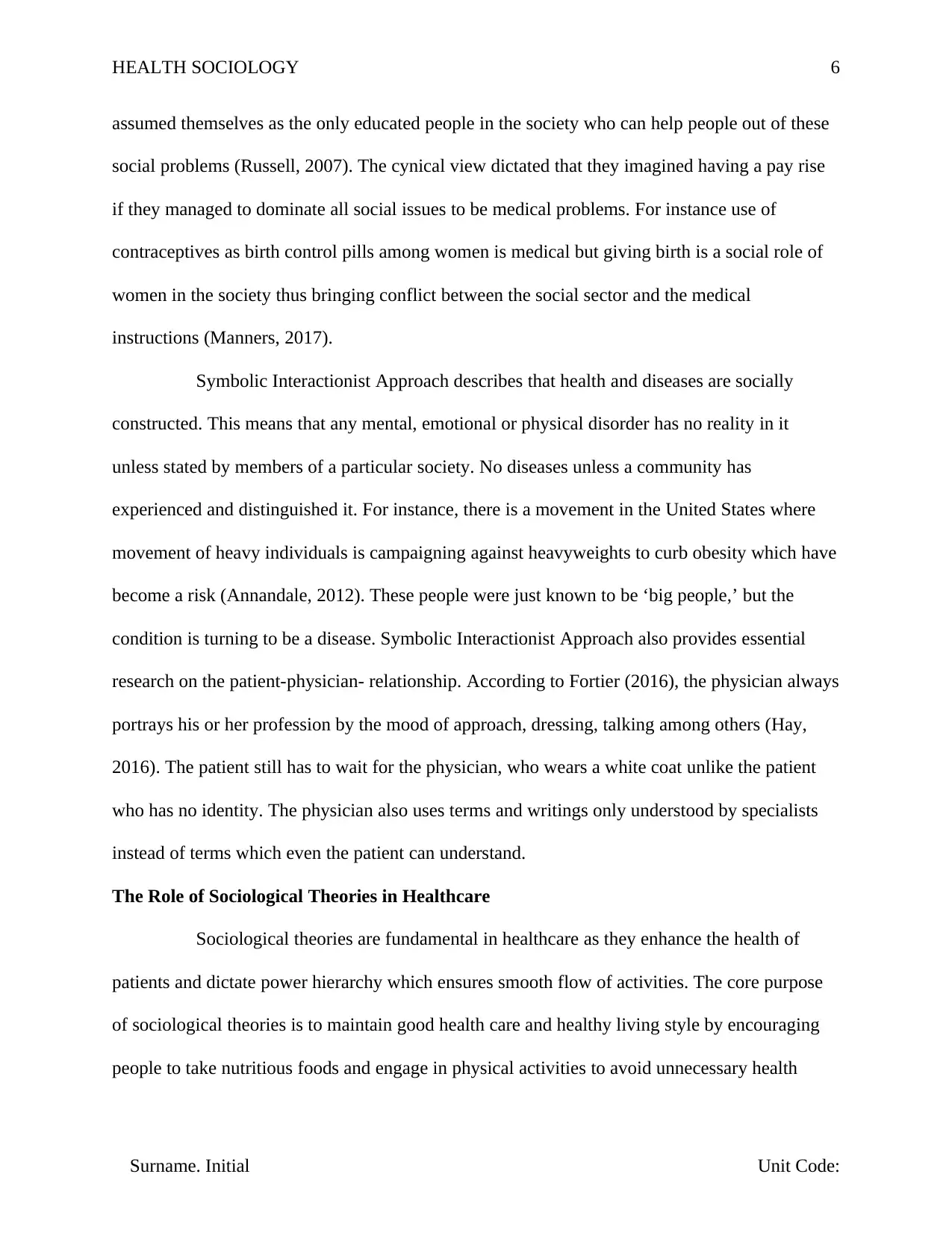
HEALTH SOCIOLOGY 6
assumed themselves as the only educated people in the society who can help people out of these
social problems (Russell, 2007). The cynical view dictated that they imagined having a pay rise
if they managed to dominate all social issues to be medical problems. For instance use of
contraceptives as birth control pills among women is medical but giving birth is a social role of
women in the society thus bringing conflict between the social sector and the medical
instructions (Manners, 2017).
Symbolic Interactionist Approach describes that health and diseases are socially
constructed. This means that any mental, emotional or physical disorder has no reality in it
unless stated by members of a particular society. No diseases unless a community has
experienced and distinguished it. For instance, there is a movement in the United States where
movement of heavy individuals is campaigning against heavyweights to curb obesity which have
become a risk (Annandale, 2012). These people were just known to be ‘big people,’ but the
condition is turning to be a disease. Symbolic Interactionist Approach also provides essential
research on the patient-physician- relationship. According to Fortier (2016), the physician always
portrays his or her profession by the mood of approach, dressing, talking among others (Hay,
2016). The patient still has to wait for the physician, who wears a white coat unlike the patient
who has no identity. The physician also uses terms and writings only understood by specialists
instead of terms which even the patient can understand.
The Role of Sociological Theories in Healthcare
Sociological theories are fundamental in healthcare as they enhance the health of
patients and dictate power hierarchy which ensures smooth flow of activities. The core purpose
of sociological theories is to maintain good health care and healthy living style by encouraging
people to take nutritious foods and engage in physical activities to avoid unnecessary health
Surname. Initial Unit Code:
assumed themselves as the only educated people in the society who can help people out of these
social problems (Russell, 2007). The cynical view dictated that they imagined having a pay rise
if they managed to dominate all social issues to be medical problems. For instance use of
contraceptives as birth control pills among women is medical but giving birth is a social role of
women in the society thus bringing conflict between the social sector and the medical
instructions (Manners, 2017).
Symbolic Interactionist Approach describes that health and diseases are socially
constructed. This means that any mental, emotional or physical disorder has no reality in it
unless stated by members of a particular society. No diseases unless a community has
experienced and distinguished it. For instance, there is a movement in the United States where
movement of heavy individuals is campaigning against heavyweights to curb obesity which have
become a risk (Annandale, 2012). These people were just known to be ‘big people,’ but the
condition is turning to be a disease. Symbolic Interactionist Approach also provides essential
research on the patient-physician- relationship. According to Fortier (2016), the physician always
portrays his or her profession by the mood of approach, dressing, talking among others (Hay,
2016). The patient still has to wait for the physician, who wears a white coat unlike the patient
who has no identity. The physician also uses terms and writings only understood by specialists
instead of terms which even the patient can understand.
The Role of Sociological Theories in Healthcare
Sociological theories are fundamental in healthcare as they enhance the health of
patients and dictate power hierarchy which ensures smooth flow of activities. The core purpose
of sociological theories is to maintain good health care and healthy living style by encouraging
people to take nutritious foods and engage in physical activities to avoid unnecessary health
Surname. Initial Unit Code:
⊘ This is a preview!⊘
Do you want full access?
Subscribe today to unlock all pages.

Trusted by 1+ million students worldwide
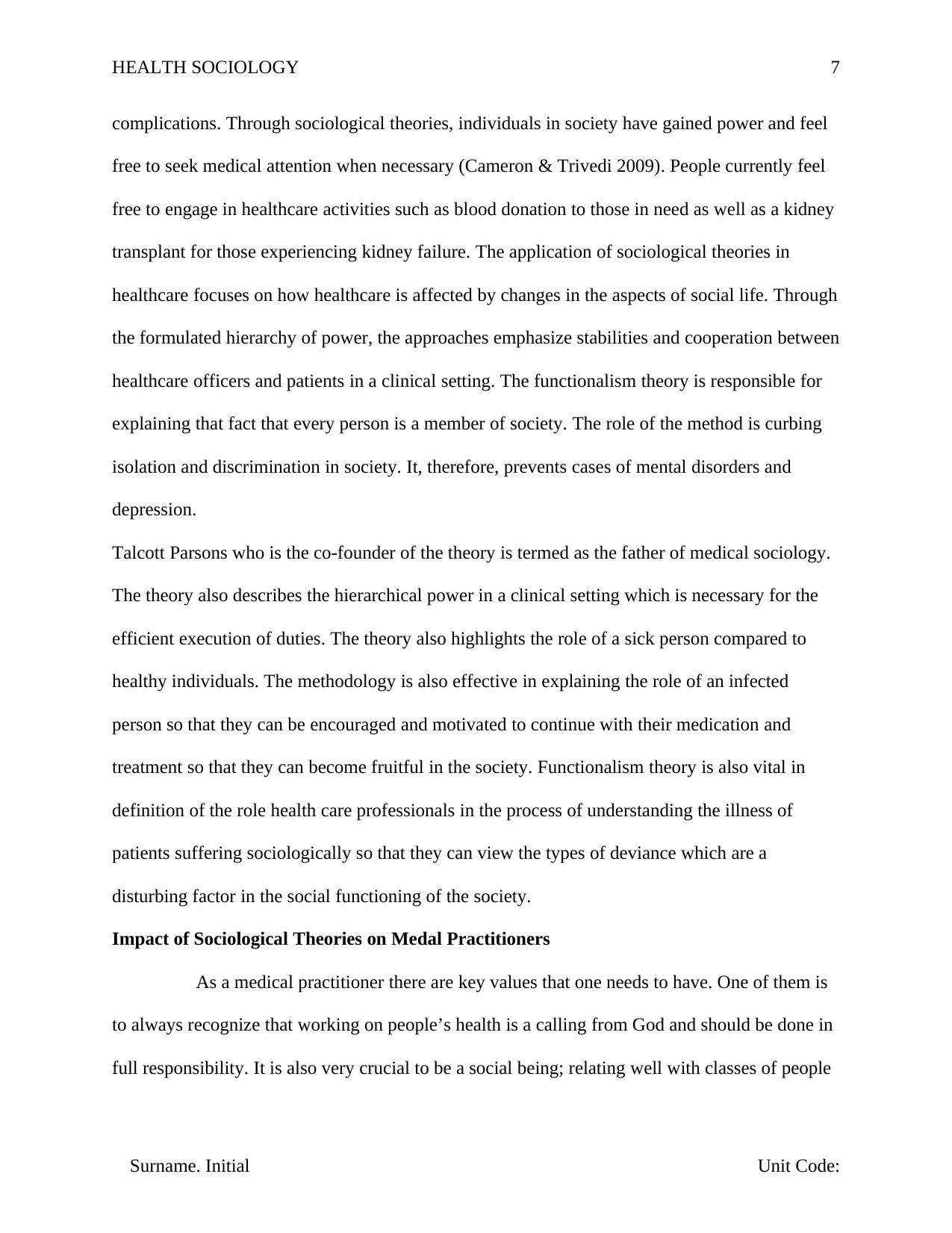
HEALTH SOCIOLOGY 7
complications. Through sociological theories, individuals in society have gained power and feel
free to seek medical attention when necessary (Cameron & Trivedi 2009). People currently feel
free to engage in healthcare activities such as blood donation to those in need as well as a kidney
transplant for those experiencing kidney failure. The application of sociological theories in
healthcare focuses on how healthcare is affected by changes in the aspects of social life. Through
the formulated hierarchy of power, the approaches emphasize stabilities and cooperation between
healthcare officers and patients in a clinical setting. The functionalism theory is responsible for
explaining that fact that every person is a member of society. The role of the method is curbing
isolation and discrimination in society. It, therefore, prevents cases of mental disorders and
depression.
Talcott Parsons who is the co-founder of the theory is termed as the father of medical sociology.
The theory also describes the hierarchical power in a clinical setting which is necessary for the
efficient execution of duties. The theory also highlights the role of a sick person compared to
healthy individuals. The methodology is also effective in explaining the role of an infected
person so that they can be encouraged and motivated to continue with their medication and
treatment so that they can become fruitful in the society. Functionalism theory is also vital in
definition of the role health care professionals in the process of understanding the illness of
patients suffering sociologically so that they can view the types of deviance which are a
disturbing factor in the social functioning of the society.
Impact of Sociological Theories on Medal Practitioners
As a medical practitioner there are key values that one needs to have. One of them is
to always recognize that working on people’s health is a calling from God and should be done in
full responsibility. It is also very crucial to be a social being; relating well with classes of people
Surname. Initial Unit Code:
complications. Through sociological theories, individuals in society have gained power and feel
free to seek medical attention when necessary (Cameron & Trivedi 2009). People currently feel
free to engage in healthcare activities such as blood donation to those in need as well as a kidney
transplant for those experiencing kidney failure. The application of sociological theories in
healthcare focuses on how healthcare is affected by changes in the aspects of social life. Through
the formulated hierarchy of power, the approaches emphasize stabilities and cooperation between
healthcare officers and patients in a clinical setting. The functionalism theory is responsible for
explaining that fact that every person is a member of society. The role of the method is curbing
isolation and discrimination in society. It, therefore, prevents cases of mental disorders and
depression.
Talcott Parsons who is the co-founder of the theory is termed as the father of medical sociology.
The theory also describes the hierarchical power in a clinical setting which is necessary for the
efficient execution of duties. The theory also highlights the role of a sick person compared to
healthy individuals. The methodology is also effective in explaining the role of an infected
person so that they can be encouraged and motivated to continue with their medication and
treatment so that they can become fruitful in the society. Functionalism theory is also vital in
definition of the role health care professionals in the process of understanding the illness of
patients suffering sociologically so that they can view the types of deviance which are a
disturbing factor in the social functioning of the society.
Impact of Sociological Theories on Medal Practitioners
As a medical practitioner there are key values that one needs to have. One of them is
to always recognize that working on people’s health is a calling from God and should be done in
full responsibility. It is also very crucial to be a social being; relating well with classes of people
Surname. Initial Unit Code:
Paraphrase This Document
Need a fresh take? Get an instant paraphrase of this document with our AI Paraphraser
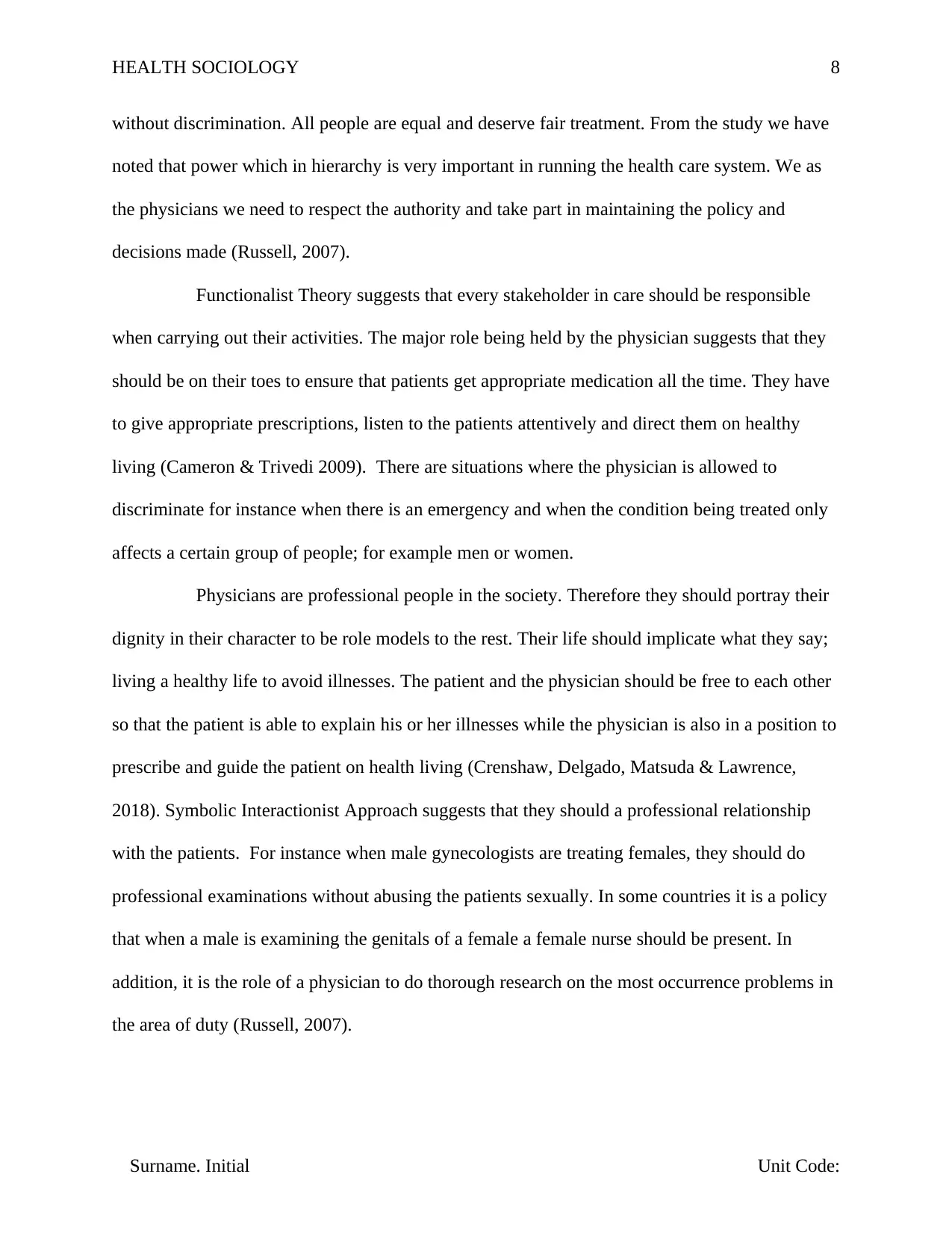
HEALTH SOCIOLOGY 8
without discrimination. All people are equal and deserve fair treatment. From the study we have
noted that power which in hierarchy is very important in running the health care system. We as
the physicians we need to respect the authority and take part in maintaining the policy and
decisions made (Russell, 2007).
Functionalist Theory suggests that every stakeholder in care should be responsible
when carrying out their activities. The major role being held by the physician suggests that they
should be on their toes to ensure that patients get appropriate medication all the time. They have
to give appropriate prescriptions, listen to the patients attentively and direct them on healthy
living (Cameron & Trivedi 2009). There are situations where the physician is allowed to
discriminate for instance when there is an emergency and when the condition being treated only
affects a certain group of people; for example men or women.
Physicians are professional people in the society. Therefore they should portray their
dignity in their character to be role models to the rest. Their life should implicate what they say;
living a healthy life to avoid illnesses. The patient and the physician should be free to each other
so that the patient is able to explain his or her illnesses while the physician is also in a position to
prescribe and guide the patient on health living (Crenshaw, Delgado, Matsuda & Lawrence,
2018). Symbolic Interactionist Approach suggests that they should a professional relationship
with the patients. For instance when male gynecologists are treating females, they should do
professional examinations without abusing the patients sexually. In some countries it is a policy
that when a male is examining the genitals of a female a female nurse should be present. In
addition, it is the role of a physician to do thorough research on the most occurrence problems in
the area of duty (Russell, 2007).
Surname. Initial Unit Code:
without discrimination. All people are equal and deserve fair treatment. From the study we have
noted that power which in hierarchy is very important in running the health care system. We as
the physicians we need to respect the authority and take part in maintaining the policy and
decisions made (Russell, 2007).
Functionalist Theory suggests that every stakeholder in care should be responsible
when carrying out their activities. The major role being held by the physician suggests that they
should be on their toes to ensure that patients get appropriate medication all the time. They have
to give appropriate prescriptions, listen to the patients attentively and direct them on healthy
living (Cameron & Trivedi 2009). There are situations where the physician is allowed to
discriminate for instance when there is an emergency and when the condition being treated only
affects a certain group of people; for example men or women.
Physicians are professional people in the society. Therefore they should portray their
dignity in their character to be role models to the rest. Their life should implicate what they say;
living a healthy life to avoid illnesses. The patient and the physician should be free to each other
so that the patient is able to explain his or her illnesses while the physician is also in a position to
prescribe and guide the patient on health living (Crenshaw, Delgado, Matsuda & Lawrence,
2018). Symbolic Interactionist Approach suggests that they should a professional relationship
with the patients. For instance when male gynecologists are treating females, they should do
professional examinations without abusing the patients sexually. In some countries it is a policy
that when a male is examining the genitals of a female a female nurse should be present. In
addition, it is the role of a physician to do thorough research on the most occurrence problems in
the area of duty (Russell, 2007).
Surname. Initial Unit Code:
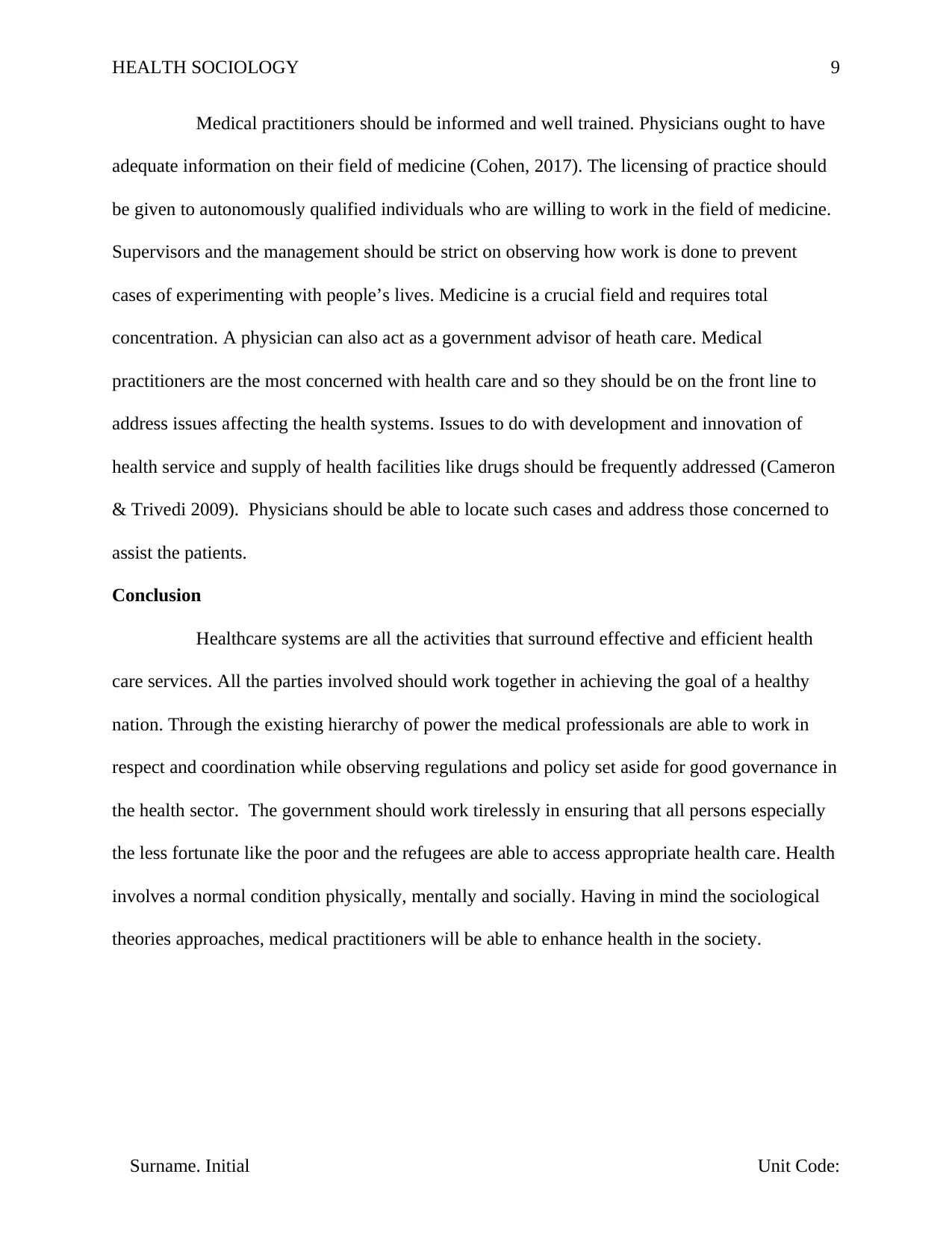
HEALTH SOCIOLOGY 9
Medical practitioners should be informed and well trained. Physicians ought to have
adequate information on their field of medicine (Cohen, 2017). The licensing of practice should
be given to autonomously qualified individuals who are willing to work in the field of medicine.
Supervisors and the management should be strict on observing how work is done to prevent
cases of experimenting with people’s lives. Medicine is a crucial field and requires total
concentration. A physician can also act as a government advisor of heath care. Medical
practitioners are the most concerned with health care and so they should be on the front line to
address issues affecting the health systems. Issues to do with development and innovation of
health service and supply of health facilities like drugs should be frequently addressed (Cameron
& Trivedi 2009). Physicians should be able to locate such cases and address those concerned to
assist the patients.
Conclusion
Healthcare systems are all the activities that surround effective and efficient health
care services. All the parties involved should work together in achieving the goal of a healthy
nation. Through the existing hierarchy of power the medical professionals are able to work in
respect and coordination while observing regulations and policy set aside for good governance in
the health sector. The government should work tirelessly in ensuring that all persons especially
the less fortunate like the poor and the refugees are able to access appropriate health care. Health
involves a normal condition physically, mentally and socially. Having in mind the sociological
theories approaches, medical practitioners will be able to enhance health in the society.
Surname. Initial Unit Code:
Medical practitioners should be informed and well trained. Physicians ought to have
adequate information on their field of medicine (Cohen, 2017). The licensing of practice should
be given to autonomously qualified individuals who are willing to work in the field of medicine.
Supervisors and the management should be strict on observing how work is done to prevent
cases of experimenting with people’s lives. Medicine is a crucial field and requires total
concentration. A physician can also act as a government advisor of heath care. Medical
practitioners are the most concerned with health care and so they should be on the front line to
address issues affecting the health systems. Issues to do with development and innovation of
health service and supply of health facilities like drugs should be frequently addressed (Cameron
& Trivedi 2009). Physicians should be able to locate such cases and address those concerned to
assist the patients.
Conclusion
Healthcare systems are all the activities that surround effective and efficient health
care services. All the parties involved should work together in achieving the goal of a healthy
nation. Through the existing hierarchy of power the medical professionals are able to work in
respect and coordination while observing regulations and policy set aside for good governance in
the health sector. The government should work tirelessly in ensuring that all persons especially
the less fortunate like the poor and the refugees are able to access appropriate health care. Health
involves a normal condition physically, mentally and socially. Having in mind the sociological
theories approaches, medical practitioners will be able to enhance health in the society.
Surname. Initial Unit Code:
⊘ This is a preview!⊘
Do you want full access?
Subscribe today to unlock all pages.

Trusted by 1+ million students worldwide
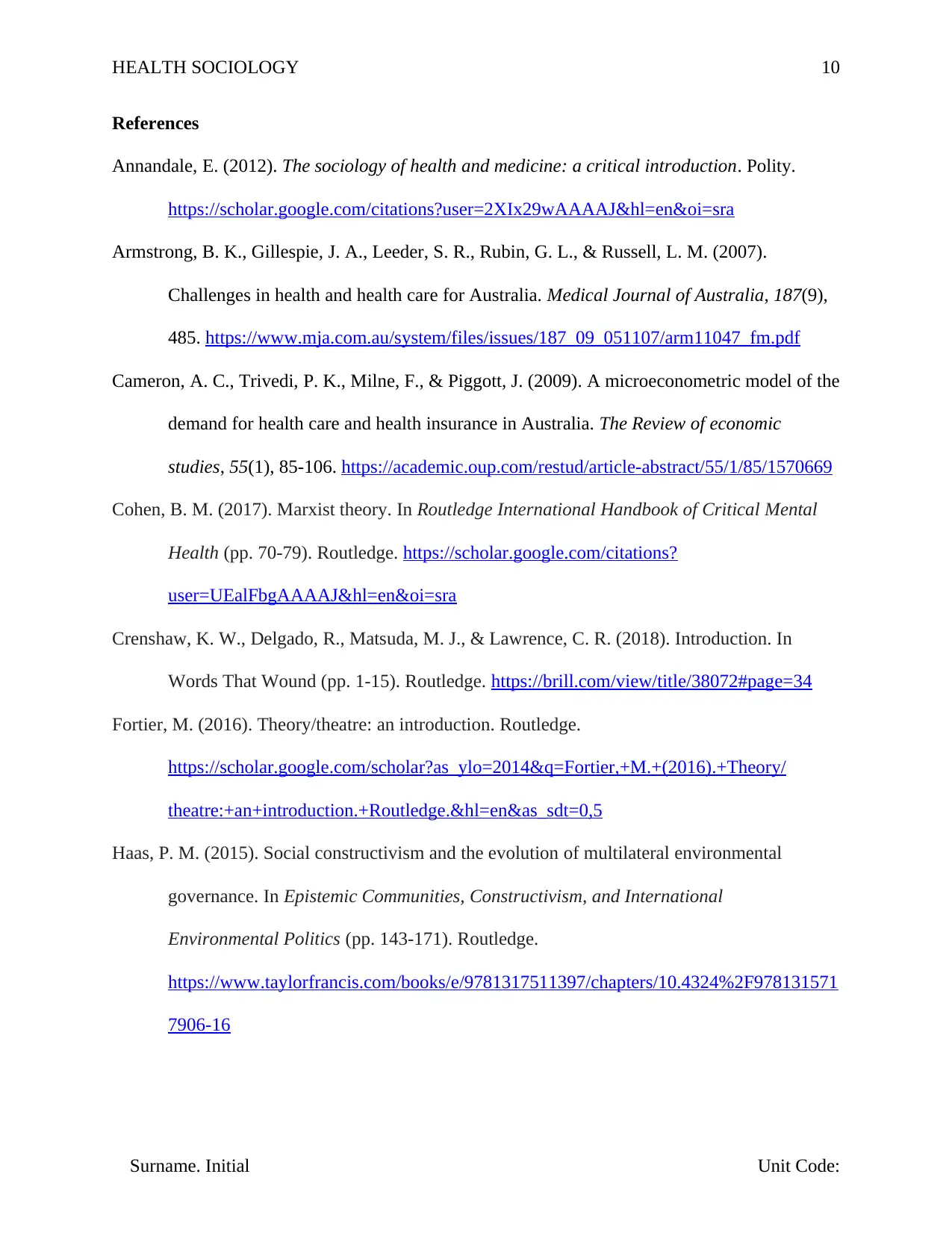
HEALTH SOCIOLOGY 10
References
Annandale, E. (2012). The sociology of health and medicine: a critical introduction. Polity.
https://scholar.google.com/citations?user=2XIx29wAAAAJ&hl=en&oi=sra
Armstrong, B. K., Gillespie, J. A., Leeder, S. R., Rubin, G. L., & Russell, L. M. (2007).
Challenges in health and health care for Australia. Medical Journal of Australia, 187(9),
485. https://www.mja.com.au/system/files/issues/187_09_051107/arm11047_fm.pdf
Cameron, A. C., Trivedi, P. K., Milne, F., & Piggott, J. (2009). A microeconometric model of the
demand for health care and health insurance in Australia. The Review of economic
studies, 55(1), 85-106. https://academic.oup.com/restud/article-abstract/55/1/85/1570669
Cohen, B. M. (2017). Marxist theory. In Routledge International Handbook of Critical Mental
Health (pp. 70-79). Routledge. https://scholar.google.com/citations?
user=UEalFbgAAAAJ&hl=en&oi=sra
Crenshaw, K. W., Delgado, R., Matsuda, M. J., & Lawrence, C. R. (2018). Introduction. In
Words That Wound (pp. 1-15). Routledge. https://brill.com/view/title/38072#page=34
Fortier, M. (2016). Theory/theatre: an introduction. Routledge.
https://scholar.google.com/scholar?as_ylo=2014&q=Fortier,+M.+(2016).+Theory/
theatre:+an+introduction.+Routledge.&hl=en&as_sdt=0,5
Haas, P. M. (2015). Social constructivism and the evolution of multilateral environmental
governance. In Epistemic Communities, Constructivism, and International
Environmental Politics (pp. 143-171). Routledge.
https://www.taylorfrancis.com/books/e/9781317511397/chapters/10.4324%2F978131571
7906-16
Surname. Initial Unit Code:
References
Annandale, E. (2012). The sociology of health and medicine: a critical introduction. Polity.
https://scholar.google.com/citations?user=2XIx29wAAAAJ&hl=en&oi=sra
Armstrong, B. K., Gillespie, J. A., Leeder, S. R., Rubin, G. L., & Russell, L. M. (2007).
Challenges in health and health care for Australia. Medical Journal of Australia, 187(9),
485. https://www.mja.com.au/system/files/issues/187_09_051107/arm11047_fm.pdf
Cameron, A. C., Trivedi, P. K., Milne, F., & Piggott, J. (2009). A microeconometric model of the
demand for health care and health insurance in Australia. The Review of economic
studies, 55(1), 85-106. https://academic.oup.com/restud/article-abstract/55/1/85/1570669
Cohen, B. M. (2017). Marxist theory. In Routledge International Handbook of Critical Mental
Health (pp. 70-79). Routledge. https://scholar.google.com/citations?
user=UEalFbgAAAAJ&hl=en&oi=sra
Crenshaw, K. W., Delgado, R., Matsuda, M. J., & Lawrence, C. R. (2018). Introduction. In
Words That Wound (pp. 1-15). Routledge. https://brill.com/view/title/38072#page=34
Fortier, M. (2016). Theory/theatre: an introduction. Routledge.
https://scholar.google.com/scholar?as_ylo=2014&q=Fortier,+M.+(2016).+Theory/
theatre:+an+introduction.+Routledge.&hl=en&as_sdt=0,5
Haas, P. M. (2015). Social constructivism and the evolution of multilateral environmental
governance. In Epistemic Communities, Constructivism, and International
Environmental Politics (pp. 143-171). Routledge.
https://www.taylorfrancis.com/books/e/9781317511397/chapters/10.4324%2F978131571
7906-16
Surname. Initial Unit Code:
Paraphrase This Document
Need a fresh take? Get an instant paraphrase of this document with our AI Paraphraser
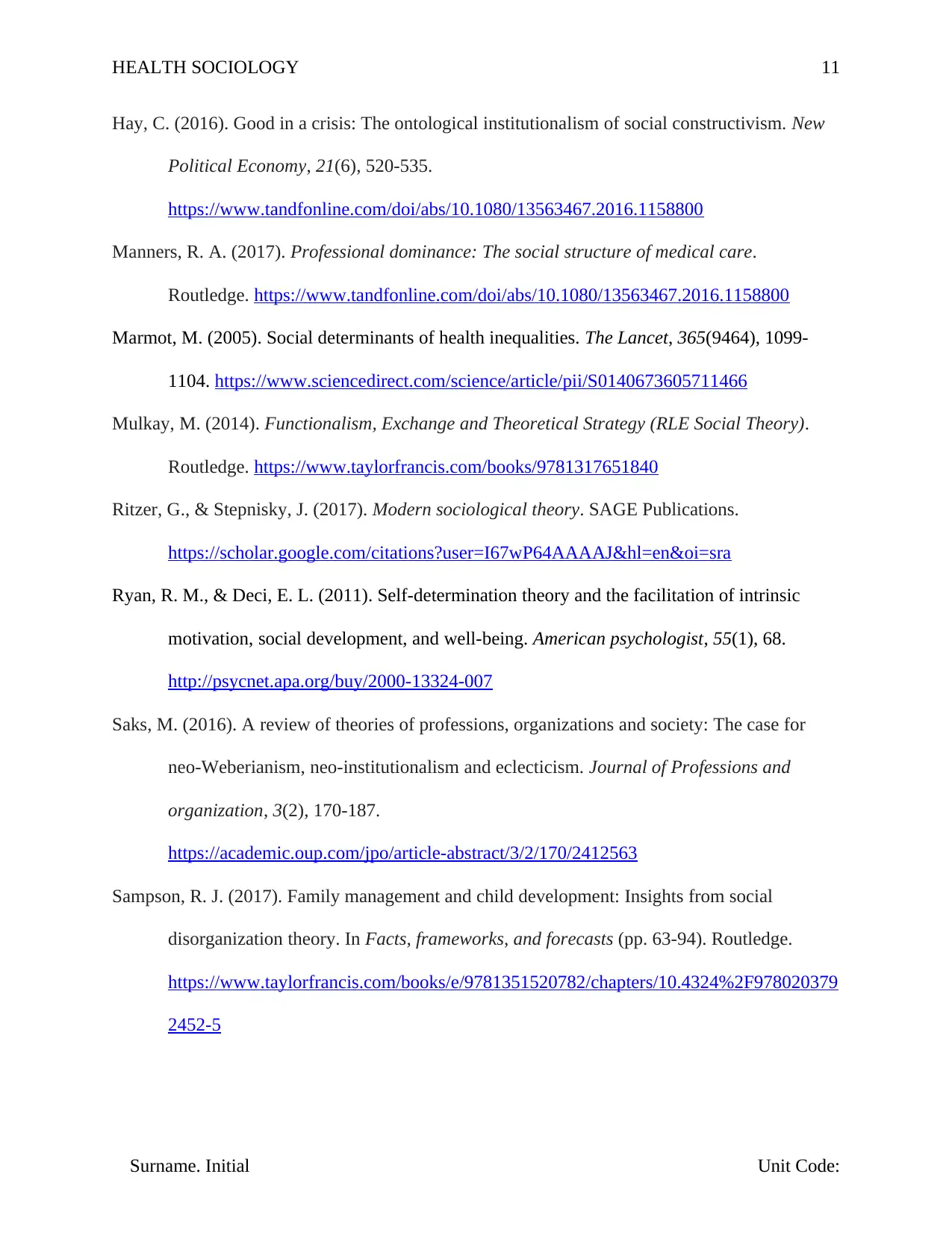
HEALTH SOCIOLOGY 11
Hay, C. (2016). Good in a crisis: The ontological institutionalism of social constructivism. New
Political Economy, 21(6), 520-535.
https://www.tandfonline.com/doi/abs/10.1080/13563467.2016.1158800
Manners, R. A. (2017). Professional dominance: The social structure of medical care.
Routledge. https://www.tandfonline.com/doi/abs/10.1080/13563467.2016.1158800
Marmot, M. (2005). Social determinants of health inequalities. The Lancet, 365(9464), 1099-
1104. https://www.sciencedirect.com/science/article/pii/S0140673605711466
Mulkay, M. (2014). Functionalism, Exchange and Theoretical Strategy (RLE Social Theory).
Routledge. https://www.taylorfrancis.com/books/9781317651840
Ritzer, G., & Stepnisky, J. (2017). Modern sociological theory. SAGE Publications.
https://scholar.google.com/citations?user=I67wP64AAAAJ&hl=en&oi=sra
Ryan, R. M., & Deci, E. L. (2011). Self-determination theory and the facilitation of intrinsic
motivation, social development, and well-being. American psychologist, 55(1), 68.
http://psycnet.apa.org/buy/2000-13324-007
Saks, M. (2016). A review of theories of professions, organizations and society: The case for
neo-Weberianism, neo-institutionalism and eclecticism. Journal of Professions and
organization, 3(2), 170-187.
https://academic.oup.com/jpo/article-abstract/3/2/170/2412563
Sampson, R. J. (2017). Family management and child development: Insights from social
disorganization theory. In Facts, frameworks, and forecasts (pp. 63-94). Routledge.
https://www.taylorfrancis.com/books/e/9781351520782/chapters/10.4324%2F978020379
2452-5
Surname. Initial Unit Code:
Hay, C. (2016). Good in a crisis: The ontological institutionalism of social constructivism. New
Political Economy, 21(6), 520-535.
https://www.tandfonline.com/doi/abs/10.1080/13563467.2016.1158800
Manners, R. A. (2017). Professional dominance: The social structure of medical care.
Routledge. https://www.tandfonline.com/doi/abs/10.1080/13563467.2016.1158800
Marmot, M. (2005). Social determinants of health inequalities. The Lancet, 365(9464), 1099-
1104. https://www.sciencedirect.com/science/article/pii/S0140673605711466
Mulkay, M. (2014). Functionalism, Exchange and Theoretical Strategy (RLE Social Theory).
Routledge. https://www.taylorfrancis.com/books/9781317651840
Ritzer, G., & Stepnisky, J. (2017). Modern sociological theory. SAGE Publications.
https://scholar.google.com/citations?user=I67wP64AAAAJ&hl=en&oi=sra
Ryan, R. M., & Deci, E. L. (2011). Self-determination theory and the facilitation of intrinsic
motivation, social development, and well-being. American psychologist, 55(1), 68.
http://psycnet.apa.org/buy/2000-13324-007
Saks, M. (2016). A review of theories of professions, organizations and society: The case for
neo-Weberianism, neo-institutionalism and eclecticism. Journal of Professions and
organization, 3(2), 170-187.
https://academic.oup.com/jpo/article-abstract/3/2/170/2412563
Sampson, R. J. (2017). Family management and child development: Insights from social
disorganization theory. In Facts, frameworks, and forecasts (pp. 63-94). Routledge.
https://www.taylorfrancis.com/books/e/9781351520782/chapters/10.4324%2F978020379
2452-5
Surname. Initial Unit Code:
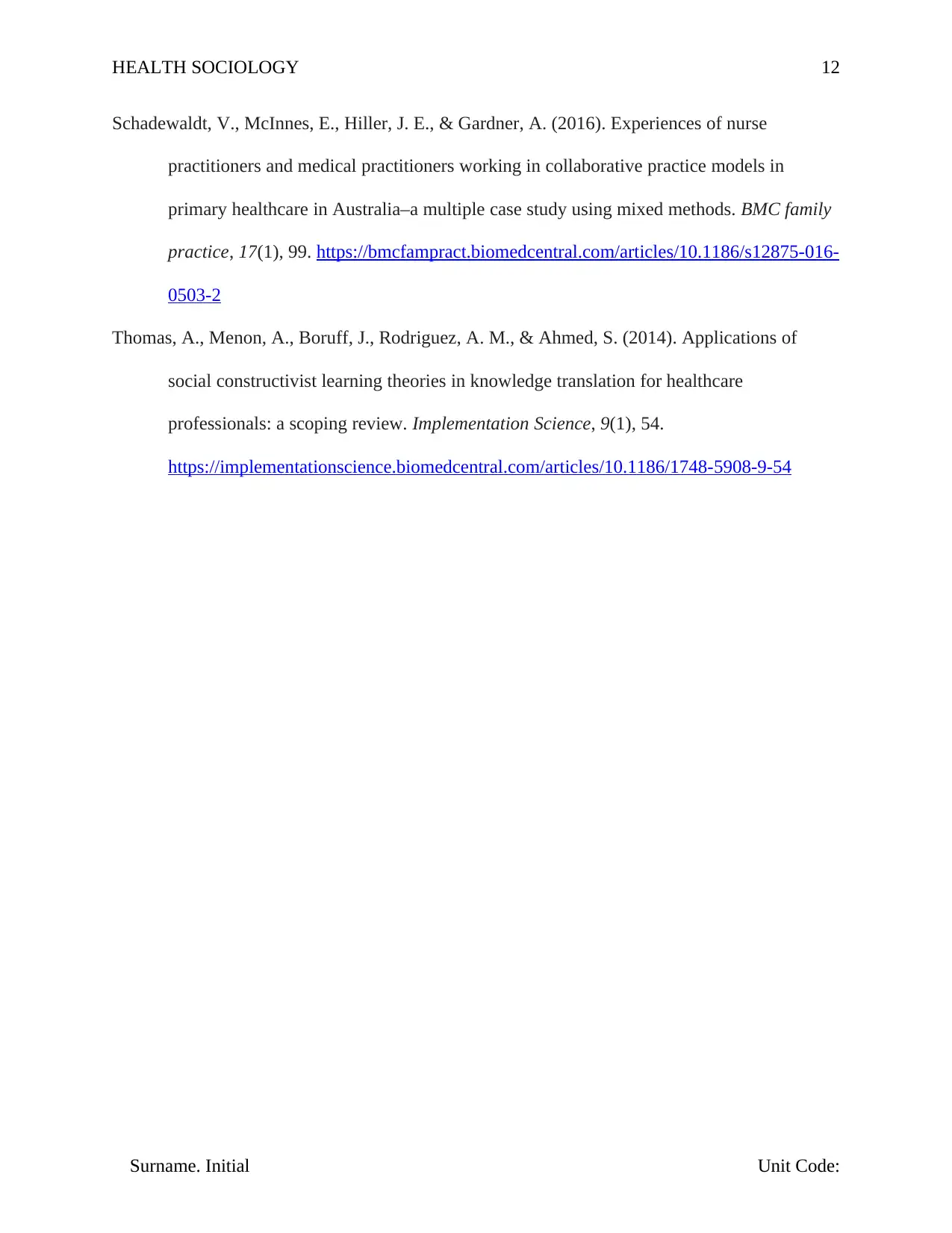
HEALTH SOCIOLOGY 12
Schadewaldt, V., McInnes, E., Hiller, J. E., & Gardner, A. (2016). Experiences of nurse
practitioners and medical practitioners working in collaborative practice models in
primary healthcare in Australia–a multiple case study using mixed methods. BMC family
practice, 17(1), 99. https://bmcfampract.biomedcentral.com/articles/10.1186/s12875-016-
0503-2
Thomas, A., Menon, A., Boruff, J., Rodriguez, A. M., & Ahmed, S. (2014). Applications of
social constructivist learning theories in knowledge translation for healthcare
professionals: a scoping review. Implementation Science, 9(1), 54.
https://implementationscience.biomedcentral.com/articles/10.1186/1748-5908-9-54
Surname. Initial Unit Code:
Schadewaldt, V., McInnes, E., Hiller, J. E., & Gardner, A. (2016). Experiences of nurse
practitioners and medical practitioners working in collaborative practice models in
primary healthcare in Australia–a multiple case study using mixed methods. BMC family
practice, 17(1), 99. https://bmcfampract.biomedcentral.com/articles/10.1186/s12875-016-
0503-2
Thomas, A., Menon, A., Boruff, J., Rodriguez, A. M., & Ahmed, S. (2014). Applications of
social constructivist learning theories in knowledge translation for healthcare
professionals: a scoping review. Implementation Science, 9(1), 54.
https://implementationscience.biomedcentral.com/articles/10.1186/1748-5908-9-54
Surname. Initial Unit Code:
⊘ This is a preview!⊘
Do you want full access?
Subscribe today to unlock all pages.

Trusted by 1+ million students worldwide
1 out of 12
Related Documents
Your All-in-One AI-Powered Toolkit for Academic Success.
+13062052269
info@desklib.com
Available 24*7 on WhatsApp / Email
![[object Object]](/_next/static/media/star-bottom.7253800d.svg)
Unlock your academic potential
Copyright © 2020–2026 A2Z Services. All Rights Reserved. Developed and managed by ZUCOL.



